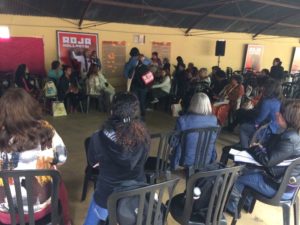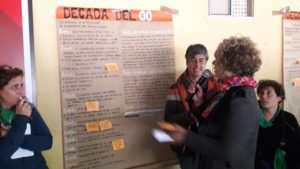This workshop provided a moment for reflection, among the more than 50 participants, on the recent mobilizations on March 8 in the region, recovering the genealogy of feminisms and posing questions on their challenges and proposals. DAWN invited participants to take a journey through the history of mobilizations of the women’s and feminist movement from the 70s up to now. The video with images and posters showing the decades were very emotional and useful tools that helped develop this activity.
https://www.youtube.com/watch?v=z7huFOB_tTI
Many shared their memories of “those times of struggle” and contributed recalling other milestones in those junctures: struggles for water, creation of unions, struggles for labor rights, celebration of the first national feminist gatherings, etc. An incredible intercultural and intergenerational exchange took place: from a colleague who participated in the 4th World Conference on Women in Beijing to a young 17-year old feminist who attended EFLAC with her mother and shared her experience of discovering her feminist feelings in her study center.

In this context, DAWN shared a brief analysis of the emergence and fracturing of social contracts, the persistence and resistance of social movements and the human rights agenda in force. The new fierce world was described, marked by the “war on terrorism” and a series of financial and economic crises. Admittedly, we are going through an ecologic crisis and climate change; the world of work has shifted dramatically towards flexibility and precariousness and we are living in a time of setbacks in the face of the achievements obtained in terms of social justice and human rights. Claudia Ferreira from CACES in Brazil and Fernanda Carrillo from Mujeres Públicas in Argentina, provided specific examples on the contexts and the response of the feminist movement and other social movements in the face of the attacks to democracy and the setbacks in terms of human rights. The discussion then focused mostly on thinking about the following questions:
What are the main challenges that feminist movements face when building new alliances and connections? In the face of this conservative and fundamentalist wave, are there feminist political projects that could be considered a promise/opportunity/alternative? How can we face this conservative and fundamentalist wave? What fruitful strategies have worked in our countries?
After a decade of progressive governments in the region, today we see the fragility of the progress attained. In the face of this challenge should we question the framework of rights as the means and the purpose of our resistance? How can social movements protect the processes of expansion of rights to avoid the interruption of these processes during transitions?
Time ran a bit short for the final conclusions. This session started later than planned because the previous workshop with the famous activist and feminist, Rita Segato, extended more than expected. DAWN took the contact details of the participants to continue the dialogue and communication through other spaces and plataforms.
